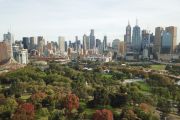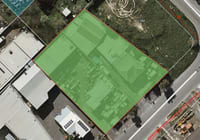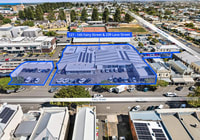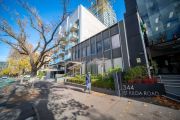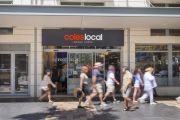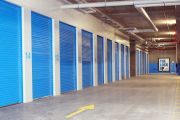Physical inspections have returned, but many vendors will wait to sell next year, agents say
Despite the resumption of physical inspections for Melbourne commercial properties, some agents are recommending vendors hold off and sell in the new year when there will be more time and a more favourable selling environment.
“We have been speaking with a number of vendors regarding the final months of 2020, our advice has been to consider a campaign starting early next year when the legislation around lending has eased, making it easier for buyers to secure money from the banks,” CBRE agent Nic Hage said.
“This will also coincide with the expiry of legislation around COVID-19 rental relief. This is a time where we feel vendors will achieve a better price than they will for the final months of 2020, particularly given the relatively short amount of time to expose their properties.”
It’s a sentiment shared by Fitzroys’ director Chris Kombi, who said with just seven weeks or so remaining in the traditional listing year, many agents would choose to hold off their campaign until next year.
“I’ve noticed there’s more listings coming up … once [Premier] Dan Andrews allowed the commercial agents to show properties that then meant people were able to inspect the stock already on the market and then vendors had confidence to bring new stock on,” he said.
“[But] the difficulty is we’re in late October and some of these campaigns commenced now will be getting into December [by the time of auction or EOI close]. That has stopped some agents bringing stock onto market now.”
Mr Kombi said the potential build-up of stock resulting from this decision, along with the fact that most Melburnians would not be taking their annual summer holiday trips, could result in campaigns kicking off in the typically quiet selling month of January.
“There may be more activity in January,” he said.
Lockdown no barrier for some buyers
Both agents pointed to respective sales they had achieved during the lockdown as proof that the stage four lockdown hadn’t got in the way of getting deals done.
Mr Hage and CBRE colleague Rorey James recently sold The Beaconsfield Hub – a retail centre at 52-62 Princess Highway, in Beaconsfield, in suburban Melbourne – for between $8.5 million and $9 million.
The complex, which consists of nine separate tenants including a nail and beauty salon, pilates studio, pool shop, fashion retailer, community bank and three hospitality venues, sold with an occupancy rate of about 90 per cent, reflecting a passing yield of just over 6 per cent.
Mr Hage said more than 120 inquiries were received during the campaign, reflecting continued demand for retail assets even during the lockdown.
“With no major anchor tenant and a WALE [weighted average lease expiry] of just over two years, the result is an encouraging sign for the wider market,” he said.
This was despite a number of the shops in the complex being impacted by the restrictions.
“Bendigo Bank was permitted to trade throughout lockdown, however, the other seven leased shops were all impacted. The result of this was a substantial amount of rental relief provided over the course of the campaign – at one point, the total income was reduced by around 40 per cent,” he said.
The resumption of physical inspections, announced on October 18, had motivated the eventual purchasers to secure the property.
“Fortunately there were a number of groups who inspected the centre during a forthcoming period earlier in the year. These groups, which included two of our strongest, acted urgently upon the news of inspections being re-allowed which ultimately brought to a head the sale late on the Sunday night before inspections were permitted,” Mr Hage said.
Mr Kombi had sold six retail shops, all part of the same complex at 299 Harvest Home Road in Epping, during the ban on physical inspections.
The properties were marketed across three separate campaigns held since June and were being sold down by the developer of the complex.
“A couple of those buyers lived in proximity to the shops [and were familiar with the properties] but the others were buying sight unseen. They relied on photography, the information memorandum, our marketing materials and our data,” Mr Kombi said.
“[For buyers] a lot of it is a numbers’ game, the location important and then after that the condition of property is important,” he added.
The properties were a mix of essential and non-essential retail, with three of the seven properties forced to shutdown during the lockdown.
Mr Kombi said tight supply during the pandemic and a desperation by buyers to find alternatives to bank deposits and the sharemarket had led to prices remaining stable during the period.
“I think there’s also a demand and supply issue which was happening over those three or four months – I think that may have helped pricing remain at that level. There wasn’t a lot of stock on the market under $1 million and all of these Epping properties were under $1 million,” he said.

